#technical services WordPress theme
Explore tagged Tumblr posts
Text
How Can Ele Business Help Service Providers Build a Strong Online Presence?
Running a service-based business comes with a unique set of challenges—standing out in a saturated market, building credibility online, and providing potential clients with a seamless user experience. The Ele Business WordPress theme was designed to solve those challenges by giving service providers a powerful, easy-to-use digital platform.
A Theme Built with Service Providers in Mind
Unlike one-size-fits-all templates, Ele Business was created with service-oriented businesses at its core. Whether you’re a solo consultant, an established firm, or a growing startup, this theme has the tools you need to create a compelling online presence.
Perfect for showcasing your offerings, sharing testimonials, and presenting a compelling "About Us" page, it works beautifully as an online services WordPress theme.
Highlight Your Services with Clarity
Ele Business comes with neatly organized service sections that allow you to describe each offering in detail. Use icons, bullet points, and pricing tables to convey your value clearly and concisely.
Whether you offer local handyman work, tech repair, coaching, or corporate consulting, this theme doubles as an ideal home services WordPress template or even a creative agency site.
Customization Options That Match Your Brand
Branding is crucial for service providers. Fortunately, Ele Business includes full customization capabilities—update colors, fonts, headers, and layouts without touching any code. Add your own logo, brand voice, and visuals to stand out in your niche.
If you’re building a multi-purpose services WordPress theme, this one easily scales with your business as you expand offerings or target new markets.
Built for SEO, Speed, and Responsiveness
Your site should look amazing on every device—and load quickly, too. Ele Business meets modern standards with a mobile-responsive design, optimized performance, and SEO-friendly architecture.
These features are especially important for businesses offering local or on-demand services. You want to appear in Google search results and give users a friction-free experience when they land on your site.
Integrations and Functional Features
Booking system compatibility
Google Maps and contact form support
Blog layouts for SEO content
Newsletter sign-up integration
The theme also functions well as an agency services WordPress template, offering project showcase areas and team member bios to build trust and authority.
Final Thoughts
Ele Business delivers everything a service-based business needs to build a high-impact, lead-generating website. From sleek design and mobile responsiveness to powerful customization and SEO tools, it gives you the platform to grow your brand online.
Take advantage of this corporate services WordPress theme to attract new clients, display your expertise, and streamline your user experience.
#services WordPress theme#professional services website template#business services WordPress theme#consulting services WordPress theme#company services website theme#freelancer services WordPress template#online services WordPress theme#local services WordPress website#corporate services WordPress theme#agency services WordPress template#multi-purpose services WordPress theme#service provider website theme#custom services WordPress template#digital services WordPress theme#service booking WordPress website#on-demand services template#technical services WordPress theme#creative services WordPress theme#home services WordPress template#client services WordPress theme
0 notes
Text
autocrattic (more matt shenanigans, not tumblr this time)
I am almost definitely not the right person for this writeup, but I'm closer than most people on here, so here goes! This is all open-source tech drama, and I take my time laying out the context, but the short version is: Matt tried to extort another company, who immediately posted receipts, and now he's refusing to log off again. The long version is... long.
If you don't need software context, scroll down/find the "ok tony that's enough. tell me what's actually happening" heading, or just go read the pink sections. Or look at this PDF.
the background
So. Matt's original Good Idea was starting WordPress with fellow developer Mike Little in 2003, which is free and open-source software (FOSS) that was originally just for blogging, but now powers lots of websites that do other things. In particular, Automattic acquired WooCommerce a long time ago, which is free online store software you can run on WordPress.
FOSS is... interesting. It's a world that ultimately is powered by people who believe deeply that information and resources should be free, but often have massive blind spots (for example, Wikipedia's consistently had issues with bias, since no amount of "anyone can edit" will overcome systemic bias in terms of who has time to edit or is not going to be driven away by the existing contributor culture). As with anything else that people spend thousands of hours doing online, there's drama. As with anything else that's technically free but can be monetized, there are:
Heaps of companies and solo developers who profit off WordPress themes, plugins, hosting, and other services;
Conflicts between volunteer contributors and for-profit contributors;
Annoying founders who get way too much credit for everything the project has become.
the WordPress ecosystem
A project as heavily used as WordPress (some double-digit percentage of the Internet uses WP. I refuse to believe it's the 43% that Matt claims it is, but it's a pretty large chunk) can't survive just on the spare hours of volunteers, especially in an increasingly monetised world where its users demand functional software, are less and less tech or FOSS literate, and its contributors have no fucking time to build things for that userbase.
Matt runs Automattic, which is a privately-traded, for-profit company. The free software is run by the WordPress Foundation, which is technically completely separate (wordpress.org). The main products Automattic offers are WordPress-related: WordPress.com, a host which was designed to be beginner-friendly; Jetpack, a suite of plugins which extend WordPress in a whole bunch of ways that may or may not make sense as one big product; WooCommerce, which I've already mentioned. There's also WordPress VIP, which is the fancy bespoke five-digit-plus option for enterprise customers. And there's Tumblr, if Matt ever succeeds in putting it on WordPress. (Every Tumblr or WordPress dev I know thinks that's fucking ridiculous and impossible. Automattic's hiring for it anyway.)
Automattic devotes a chunk of its employees toward developing Core, which is what people in the WordPress space call WordPress.org, the free software. This is part of an initiative called Five for the Future — 5% of your company's profits off WordPress should go back into making the project better. Many other companies don't do this.
There are lots of other companies in the space. GoDaddy, for example, barely gives back in any way (and also sucks). WP Engine is the company this drama is about. They don't really contribute to Core. They offer relatively expensive WordPress hosting, as well as providing a series of other WordPress-related products like LocalWP (local site development software), Advanced Custom Fields (the easiest way to set up advanced taxonomies and other fields when making new types of posts. If you don't know what this means don't worry about it), etc.
Anyway. Lots of strong personalities. Lots of for-profit companies. Lots of them getting invested in, or bought by, private equity firms.
Matt being Matt, tech being tech
As was said repeatedly when Matt was flipping out about Tumblr, all of the stuff happening at Automattic is pretty normal tech company behaviour. Shit gets worse. People get less for their money. WordPress.com used to be a really good place for people starting out with a website who didn't need "real" WordPress — for $48 a year on the Personal plan, you had really limited features (no plugins or other customisable extensions), but you had a simple website with good SEO that was pretty secure, relatively easy to use, and 24-hour access to Happiness Engineers (HEs for short. Bad job title. This was my job) who could walk you through everything no matter how bad at tech you were. Then Personal plan users got moved from chat to emails only. Emails started being responded to by contractors who didn't know as much as HEs did and certainly didn't get paid half as well. Then came AI, and the mandate for HEs to try to upsell everyone things they didn't necessarily need. (This is the point at which I quit.)
But as was said then as well, most tech CEOs don't publicly get into this kind of shitfight with their users. They're horrid tyrants, but they don't do it this publicly.
ok tony that's enough. tell me what's actually happening
WordCamp US, one of the biggest WordPress industry events of the year, is the backdrop for all this. It just finished.
There are.... a lot of posts by Matt across multiple platforms because, as always, he can't log off. But here's the broad strokes.
Sep 17
Matt publishes a wanky blog post about companies that profit off open source without giving back. It targets a specific company, WP Engine.
Compare the Five For the Future pages from Automattic and WP Engine, two companies that are roughly the same size with revenue in the ballpark of half a billion. These pledges are just a proxy and aren’t perfectly accurate, but as I write this, Automattic has 3,786 hours per week (not even counting me!), and WP Engine has 47 hours. WP Engine has good people, some of whom are listed on that page, but the company is controlled by Silver Lake, a private equity firm with $102 billion in assets under management. Silver Lake doesn’t give a dang about your Open Source ideals. It just wants a return on capital. So it’s at this point that I ask everyone in the WordPress community to vote with your wallet. Who are you giving your money to? Someone who’s going to nourish the ecosystem, or someone who’s going to frack every bit of value out of it until it withers?
(It's worth noting here that Automattic is funded in part by BlackRock, who Wikipedia calls "the world's largest asset manager".)
Sep 20 (WCUS final day)
WP Engine puts out a blog post detailing their contributions to WordPress.
Matt devotes his keynote/closing speech to slamming WP Engine.
He also implies people inside WP Engine are sending him information.
For the people sending me stuff from inside companies, please do not do it on your work device. Use a personal phone, Signal with disappearing messages, etc. I have a bunch of journalists happy to connect you with as well. #wcus — Twitter I know private equity and investors can be brutal (read the book Barbarians at the Gate). Please let me know if any employee faces firing or retaliation for speaking up about their company's participation (or lack thereof) in WordPress. We'll make sure it's a big public deal and that you get support. — Tumblr
Matt also puts out an offer live at WordCamp US:
“If anyone of you gets in trouble for speaking up in favor of WordPress and/or open source, reach out to me. I’ll do my best to help you find a new job.” — source tweet, RTed by Matt
He also puts up a poll asking the community if WP Engine should be allowed back at WordCamps.
Sep 21
Matt writes a blog post on the WordPress.org blog (the official project blog!): WP Engine is not WordPress.
He opens this blog post by claiming his mom was confused and thought WP Engine was official.
The blog post goes on about how WP Engine disabled post revisions (which is a pretty normal thing to do when you need to free up some resources), therefore being not "real" WordPress. (As I said earlier, WordPress.com disables most features for Personal and Premium plans. Or whatever those plans are called, they've been renamed like 12 times in the last few years. But that's a different complaint.)
Sep 22: More bullshit on Twitter. Matt makes a Reddit post on r/Wordpress about WP Engine that promptly gets deleted. Writeups start to come out:
Search Engine Journal: WordPress Co-Founder Mullenweg Sparks Backlash
TechCrunch: Matt Mullenweg calls WP Engine a ‘cancer to WordPress’ and urges community to switch providers
Sep 23 onward
Okay, time zones mean I can't effectively sequence the rest of this.
Matt defends himself on Reddit, casually mentioning that WP Engine is now suing him.
Also here's a decent writeup from someone involved with the community that may be of interest.
WP Engine drops the full PDF of their cease and desist, which includes screenshots of Matt apparently threatening them via text.
Twitter link | Direct PDF link
This PDF includes some truly fucked texts where Matt appears to be trying to get WP Engine to pay him money unless they want him to tell his audience at WCUS that they're evil.
Matt, after saying he's been sued and can't talk about it, hosts a Twitter Space and talks about it for a couple hours.
He also continues to post on Reddit, Twitter, and on the Core contributor Slack.
Here's a comment where he says WP Engine could have avoided this by paying Automattic 8% of their revenue.
Another, 20 hours ago, where he says he's being downvoted by "trolls, probably WPE employees"
At some point, Matt updates the WordPress Foundation trademark policy. I am 90% sure this was him — it's not legalese and makes no fucking sense to single out WP Engine.
Old text: The abbreviation “WP” is not covered by the WordPress trademarks and you are free to use it in any way you see fit. New text: The abbreviation “WP” is not covered by the WordPress trademarks, but please don’t use it in a way that confuses people. For example, many people think WP Engine is “WordPress Engine” and officially associated with WordPress, which it’s not. They have never once even donated to the WordPress Foundation, despite making billions of revenue on top of WordPress.
Sep 25: Automattic puts up their own legal response.
anyway this fucking sucks
This is bigger than anything Matt's done before. I'm so worried about my friends who're still there. The internal ramifications have... been not great so far, including that Matt's naturally being extra gung-ho about "you're either for me or against me and if you're against me then don't bother working your two weeks".
Despite everything, I like WordPress. (If you dig into this, you'll see plenty of people commenting about blocks or Gutenberg or React other things they hate. Unlike many of the old FOSSheads, I actually also think Gutenberg/the block editor was a good idea, even if it was poorly implemented.)
I think that the original mission — to make it so anyone can spin up a website that's easy enough to use and blog with — is a good thing. I think, despite all the ways being part of FOSS communities since my early teens has led to all kinds of racist, homophobic and sexual harm for me and for many other people, that free and open-source software is important.
So many people were already burning out of the project. Matt has been doing this for so long that those with long memories can recite all the ways he's wrecked shit back a decade or more. Most of us are exhausted and need to make money to live. The world is worse than it ever was.
Social media sucks worse and worse, and this was a world in which people missed old webrings, old blogs, RSS readers, the world where you curated your own whimsical, unpaid corner of the Internet. I started actually actively using my own WordPress blog this year, and I've really enjoyed it.
And people don't want to deal with any of this.
The thing is, Matt's right about one thing: capital is ruining free open-source software. What he's wrong about is everything else: the idea that WordPress.com isn't enshittifying (or confusing) at a much higher rate than WP Engine, the idea that WP Engine or Silver Lake are the only big players in the field, the notion that he's part of the solution and not part of the problem.
But he's started a battle where there are no winners but the lawyers who get paid to duke it out, and all the volunteers who've survived this long in an ecosystem increasingly dominated by big money are giving up and leaving.
Anyway if you got this far, consider donating to someone on gazafunds.com. It'll take much less time than reading this did.
#tony muses#tumblr meta#again just bc that's my tag for all this#automattic#wordpress#this is probably really incoherent i apologise lmao#i may edit it
750 notes
·
View notes
Text
WordPress Website Designing Services In Delhi
Introduction
In today's digital world, having a strong online presence is essential for businesses of all sizes. Whether you're a startup, a small business, or a large enterprise, a well-designed website is crucial to attract customers and establish credibility. When it comes to website development, WordPress is one of the most popular and user-friendly platforms available. If you're looking for professional WordPress Website Designing Services In Delhi, you're in the right place!
Delhi is a hub of technology and innovation, with countless businesses striving to make their mark online. To stand out from the competition, your website needs to be visually appealing, functional, and optimized for search engines. In this article, we will explore the benefits of using WordPress for website design, why you should choose a professional service in Delhi, and what features to look for in a WordPress website designing company.
Why Choose WordPress for Your Website?
WordPress is the most widely used content management system (CMS) globally, powering over 40% of websites on the internet. But what makes it so popular? Let’s take a look at some of the key benefits:
1. User-Friendly Interface
WordPress is made to be user-friendly, even for novices. Managing your website doesn't require a lot of technical expertise. You can easily add material, upload images, and design your website with a straightforward interface.
2. SEO-Friendly
Search engine optimization (SEO) is critical for ranking on Google and other search engines. WordPress comes with built-in SEO features and supports various plugins like Yoast SEO, helping your site rank higher in search results.
3. Customization and Flexibility
With thousands of themes and plugins available, WordPress allows you to customize your website according to your needs. Whether you need an e-commerce store, a portfolio, or a corporate website, WordPress offers endless possibilities.
4. Mobile Responsiveness
In the mobile-first world of today, a responsive website is essential. The seamless user experience on all platforms is guaranteed by the mobile-friendly design of WordPress themes.
5. Cost-Effective Solution
Unlike custom-coded websites, WordPress offers a cost-effective solution for businesses. Many themes and plugins are available for free, while premium options are affordable and provide additional functionality.
Why Hire a Professional WordPress Website Designing Service in Delhi?
While WordPress is user-friendly, designing a website that stands out requires expertise. A professional WordPress Website Designing Services In Delhi can help you create a website that is visually appealing, fully functional, and optimized for performance. Here’s why hiring experts is a great investment:
1. Custom Design and Development
A professional provider will ensure that your website matches your brand identity by customizing the design to your business demands.
2. SEO Optimization
Expert designers integrate SEO best practices into your site structure, increasing visibility and driving organic traffic.
3. Speed and Performance Optimization
Websites that load slowly may turn off visitors. Expert developers improve user experience by optimizing your website for speed and performance.
4. Security Enhancements
Cybersecurity is a major concern for websites. Professionals ensure your site is secure, protecting it from potential threats and attacks.
5. Ongoing Support and Maintenance
A website must need regular upgrades and maintenance in order to function properly. A professional service guarantees that your website stays current and error-free by offering ongoing support.
Key Features to Look for in a WordPress Website Designing Service
When choosing a WordPress website designing company in Delhi, consider the following essential features:
1. Custom WordPress Theme Development
Instead of utilizing pre-made templates, make sure the provider offers distinctive and personalized themes. Your website stands out when it has a unique design.
2. E-commerce Integration
If you plan to sell products online, look for services that offer WooCommerce integration for seamless e-commerce functionality.
3. Responsive and Mobile-Friendly Design
Being mobile-friendly is essential. Verify if responsive design is a top priority for the business to ensure top performance across all platforms.
4. Content Management and SEO Services
Content is king! Choose a service that provides content management and SEO strategies to improve your search engine rankings.
5. User Experience (UX) and UI Design
A great website is not just about aesthetics but also about usability. A service that focuses on user experience (UX) ensures better engagement and conversions.
6. Technical Support and Maintenance
Post-launch support is crucial. Ensure the company provides regular updates, security patches, and troubleshooting assistance.
Top Industries Benefiting from WordPress Website Design in Delhi
WordPress is versatile and serves a wide range of industries. Here are some sectors that benefit the most from professional WordPress Website Designing Services In Delhi:
E-commerce: Online stores and marketplaces
Healthcare: Clinics, hospitals, and doctors’ websites
Education: Schools, colleges, and online courses
Real Estate: Property listings and real estate agencies
Corporate Websites: Business portfolios and company profiles
Blogging and News Portals: Content-focused websites
Event Management: Wedding planners, conferences, and ticket booking sites
Regardless of your industry, WordPress can be customized to meet your specific requirements and business goals.
3 notes
·
View notes
Text
Top WordPress Website Development Services: Expert Web Designers & Developers Near You

These days, your website is often the first impression people get of your business—so it needs to look good and work flawlessly. In a world where everything happens online, having a strong digital presence isn’t just nice to have—it’s essential. That’s why so many businesses turn to WordPress. It’s reliable, flexible, and built to grow with you. Whether you’re starting from scratch or giving your current site a much-needed refresh, having the right team by your side makes all the difference. At Cross Atlantic Software, we’re here to help with WordPress website development services that are designed around your goals, your brand, and your future.Why Choose WordPress?
WordPress powers over 40% of all websites on the internet—and for good reason. It’s a powerful, flexible, and scalable platform that supports everything from simple blogs to complex eCommerce sites. Its open-source nature, combined with a vast library of themes and plugins, makes it a favorite among developers and business owners alike.
However, maximizing WordPress’s potential requires more than a basic understanding. It calls for professional WordPress web design, skilled development, and ongoing optimization. That’s where Cross Atlantic Software comes in.
Our WordPress Website Development Services
At Cross Atlantic Software, our comprehensive WordPress website development services include everything from initial consultation to post-launch support. Here’s what you can expect:
1. Custom WordPress Web Design
We understand that every business is unique. Our team of experienced WordPress designers near me works closely with clients to create custom websites that reflect their brand identity, engage visitors, and convert leads. Whether you need a sleek corporate site or a visually rich portfolio, our designs are tailored to impress and perform.
2. Expert WordPress Development
Our skilled WordPress web developers specialize in creating responsive, SEO-friendly, and lightning-fast websites. From theme customization to plugin development and API integrations, we ensure your website functions seamlessly across all devices and platforms.
3. E-commerce Solutions
Want to start selling online? We integrate robust WooCommerce solutions into your WordPress site to create intuitive and secure eCommerce stores. Our WordPress website development services include product page optimization, shopping cart setup, payment gateway integration, and more.
4. Maintenance & Support
A website is not a one-time project; it requires constant updates and monitoring. We offer ongoing maintenance packages that include backups, security scans, plugin updates, and performance monitoring to keep your website running at its best.
Why Work with WordPress Experts Near You?
Searching for WordPress experts near me brings you to professionals who understand your market and can provide more personalized support. At Cross Atlantic Software, we pride ourselves on our collaborative approach and transparent communication. Being locally accessible means we’re always within reach for meetings, consultations, or urgent updates.
What Sets Cross Atlantic Software Apart?
We’re more than just WordPress web developers—we’re your digital partners. Our team combines creativity, strategy, and technical skill to deliver impactful websites that drive business results.
Client-Centric Approach: We tailor our services to your goals, not the other way around.
Proven Expertise: Our portfolio spans diverse industries and project scales.
Responsive Design: Mobile-first design ensures your site looks great on all devices.
SEO Optimization: Every project is built with SEO best practices to help you rank higher.
Local Talent: Looking for WordPress designers near me? You’ll find them here.
The Benefits of Professional WordPress Web Design
Many small businesses start with DIY templates or free website builders, but these often come with limitations. Professional WordPress web design ensures that your site is not only visually appealing but also optimized for performance, SEO, and user experience.
Benefits include:
Brand Consistency: Custom themes aligned with your branding.
Improved SEO: Faster load times and proper on-page SEO structures.
Scalability: Easily add new features or pages as your business grows.
Security: Reduced risk of hacking with the right development practices.
Case Study: A Success Story with Cross Atlantic Software
A local fitness studio approached us in search of WordPress experts near me. They needed a visually dynamic and user-friendly website to showcase their services and handle class bookings. Our team delivered a stunning custom design, integrated WooCommerce for payments, and created a seamless user experience across desktop and mobile.
The result? A 60% increase in website traffic and a 35% increase in customer sign-ups within three months.
How to Get Started
If you’re ready to elevate your online presence, don’t settle for generic solutions. Partner with Cross Atlantic Software to leverage our end-to-end WordPress website development services and achieve your business goals. Whether you're looking for WordPress web design, development, or local support from WordPress designers near me, we’ve got you covered.
Schedule a free consultation today and see how our team of dedicated WordPress web developers can transform your digital presence.
Conclusion
Your website is your most powerful digital asset. With the right design and development partner, you can create a site that not only looks good but delivers results. Cross Atlantic Software, we combine technical know-how with creative flair to offer world-class WordPress website development services that drive success.
Don’t waste time searching endlessly for WordPress experts near me or wondering if your site is up to par. Let our experienced team guide you from concept to launch—and beyond.
Contact Cross Atlantic Software today and start building your digital future.
#wordpress website development services#wordpress web design#wordpress web developers#wordpress experts near me#wordpress designers near me
2 notes
·
View notes
Text
How to Speed Up Your WordPress Site for Better Rankings
A fast-loading website is essential for better SEO, improved user experience, and higher conversions. If your WordPress site is slow, you’re likely losing both visitors and ranking opportunities. Here’s how you can fix that.
Choose the Right Hosting
Your hosting provider sets the foundation for your website’s speed. Shared hosting may be affordable, but it often leads to slow performance. Instead, go for managed WordPress hosting or cloud-based options. Many professional website development services include high-performance hosting setup as part of their package.
Use a Lightweight Theme
A bulky, feature-heavy theme can slow your site down significantly. Switch to a lightweight and optimized theme like Astra, Neve, or GeneratePress to improve load time without compromising design.
Optimize Images
Images are often the biggest contributors to page size. Compress them using tools like ShortPixel or Smush, and use next-gen formats like WebP for faster delivery.
Install a Caching Plugin
Caching helps by storing static versions of your site, reducing the server load. Plugins like WP Rocket or W3 Total Cache can make a noticeable difference in performance.
Minify and Combine Files
Reduce the size of your CSS, JS, and HTML files by minifying them. This removes unnecessary characters and spaces to speed up load time. Tools like Autoptimize make this easy.
Use a CDN
A Content Delivery Network (CDN) distributes your content across multiple servers globally, ensuring faster access no matter where your visitors are located.
Clean Up Unused Plugins and Database
Too many plugins can slow your site and affect performance. Remove what you don’t use and regularly clean your database using WP-Optimize or similar tools.
Final Thoughts
Speed is a major factor in how users and search engines interact with your site. If you’re unsure where to start, partnering with expert website development services can help you optimize every technical aspect for maximum performance and SEO benefits.
Read more -https://www.janbaskdigitaldesign.com/wordpress-website-design-and-development
2 notes
·
View notes
Text
Best Web Design and Hosting for Small Business
User experience (UX) is a top priority for a successful small company website. This features responsive layouts that guarantee smooth surfing across devices, clear information hierarchy, and easy navigation. Websites should captivate users with eye-catching graphics, excellent photos, and interactive features that are consistent with the brand's identity. For small businesses looking to establish a strong online presence, investing in quality web design and reliable hosting is paramount.
Creating a powerful brand identity is essential. In order to create a unified image that makes an impression on visitors, this entails using logos, colors, and font consistently throughout the website. Retaining user interest also requires interesting material that speaks to the demands of the target audience, including educational blog entries and captivating product descriptions.
How to Make a Website for a Small Business
Select a User-Friendly Website Builder: Website construction is made easier by the intuitive interfaces of platforms like as Squarespace, Shopify, and Wix. Because these builders frequently have drag-and-drop capabilities, consumers can alter their websites without knowing any code23.
Choose a Domain Name and Register It
A memorable domain name is crucial for internet branding and represents your company's identity. Make sure it is pertinent to your services and simple to spell.
Select a Trustworthy Web Hosting Provider
The performance of the website depends on the hosting provider selection. Important things to think about are:
Uptime Promise: To reduce downtime, look for hosts that have 99.9% uptime.
Loading Speed: To improve user experience, try to keep page load times under three seconds.
Features of Security: To safeguard your site2, be sure the server offers SSL certificates, frequent backups, and virus detection.
Customer service: For prompt problem solving, round-the-clock assistance can be essential.
Create the Visual Identity for Your Website
Make an eye-catching layout that complements the style of your brand. Make use of top-notch photos and keep design components consistent.
Plan the Navigation and Site Structure
Logically arrange your information to make it easier to navigate. A site with a clear structure makes it easier for people to find information fast.
Create Key Pages
Home, About Us, Services/Products, Blog, and Contact Us are all important pages. Every page should contribute to the general objectives of the website while fulfilling a distinct function.
Top Web Design Platforms for Small Businesses
WordPress:
Flexible and customizable with thousands of plugins and themes.
Ideal for businesses looking for scalability and SEO features.
Wix:
Drag-and-drop functionality for easy website creation.
Suitable for businesses without technical expertise.
Squarespace:
Modern templates and built-in e-commerce features.
Perfect for visually appealing designs.
Shopify:
Best for small businesses focused on e-commerce.
Features include inventory management, payment integration, and analytics.
Weebly:
Affordable and user-friendly.
Ideal for small businesses needing basic functionality.

#Best Web Design and Hosting for Small Business#website#website design#seo services#digital marketing#web design#web development#usa news#usa
3 notes
·
View notes
Text
Choosing the Right CMS for Your Website

It probably goes without saying that when developing any kind of website, one of the most strategic actions you will be taking is determining which CMS to use. It can simply be described as an application that enables users who may not have extensive knowledge on coding to build, design and edit content on their website. Like any other professional web design service provider can explain, the selection of proper CMS for your site can greatly influence how doable or manageable your site is.
Why Choosing the Right CMS matters
Choosing the right CMS is really important as it decides on how your website operates and how convenient it is to administer. A good web design company appreciates the role of a good CMS that reduces costs and time required in maintaining a site. It can also influence your website performance and that is important for enhancing users satisfaction and also the position of your website on the search engines.
Popular CMS Options
WordPress
Wordpress is one of the Content Management Systems that is on high demand in the modern Internet market. Currently, many website designing companies advise and encourage users to adopt the WordPress website since it is convenient. It is perfect for blogs and small businesses and useful for large websites. It has access to thousands of themes and plugins which will allow you to have the specific layout you require.
Joomla
The other CMS is Joomla and it is slightly complicated as compared to WordPress. It is suitable if one requires enhanced functionality and is okay with going through a complex learning curve. There are some website designing companies which prefer Joomla for the complex projects.
Drupal
Some of the benefits of using Drupal include; it has strong security measures and is known to support large and complicated websites. Still, Hadoop is mostly employed in governmental bodies together with huge-scale businesses. Despite the fact that relatively more programming skills are needed, many web site designing companies use Drupal for those clients who have particular security requirements or who have a complex structure of their web site.
Factors to talk about when Identifying the CMS.
Ease of Use
Where does or do you/your team stand in terms of your comfort level with technology? When you use CSM platforms, they vary depending on how friendly they are to the users. When it comes to selecting the right CMS, a good website designing company will guide you to the selection of the right CMS that you have adequate skills in using.
Scalability
Consider what your needs are going to be in the future. Will your website have a great expansion? But not all the CMS platforms manage growth in the same way. When choosing the best CMS for your business, your website designing company needs to factor in your vision in future.
Customization Options
If you want your website to be completely distinctive, then this is how you can achieve that. Depending on the specific CMS being used there can be quite a large variation between the amount of control each platform allows. Explain your design requirements to the website designing company so that the choice of CMS will effectively meet your requirements for the design.
Support and Community
Ensure that the chosen CMS has a good support system and a good customer base. This can be extremely beneficial when needing support and or to include more functionalities to your page. An experienced web designing company can help you in identifying the available cms platforms with better support systems.
Making Your Decision
Selecting the right CMS can be quite a significant decision and that you don’t have to make on your own. Often it might be prudent to consult a professional website designing company that can consider your needs, budget and technical capacities to suggest you the most appropriate CMS for the undertaking in question. They can also assist you to choose your ideal CMS and implement it with the specific aim and appearance of your website in mind.
Just be advised that there are no two identical CMS platforms and there is nothing which fits all. Sometimes the strategies that a particular website uses will not be as effective for another website. Be patient and do not rush into enrolling in any college without consulting and gather as much information as you can. Therefore by choosing the right CMS and working with a good website designing company you will be on the right path as far as establishing and managing a successful website is concerned.
2 notes
·
View notes
Text
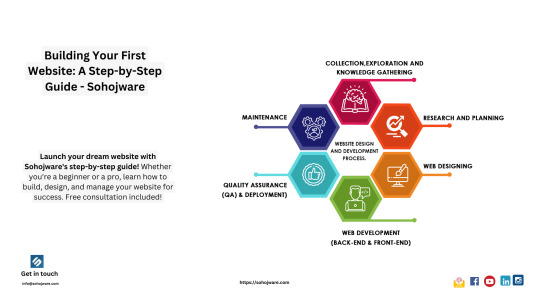
The internet has become an essential part of our lives. Whether you're a business owner, entrepreneur, freelancer, or simply want a platform to share your passions, having a website is crucial in today's digital age. But for many, the idea of building a website can seem daunting. This step-by-step guide by Sohojware, a leading web design and development company, will empower you to create your website with ease, even if you have no prior experience.
Planning Your Website
Before diving into the technical aspects of building your website, it's important to have a clear plan in mind. Here are some key questions to consider:
What is the purpose of your website? Are you selling products or services? Are you showcasing your portfolio or sharing a hobby? Identifying your website's goal will guide your design and content decisions.
Who is your target audience? Understanding your ideal visitors will help you tailor your website's content and tone to resonate with them.
What kind of content will you include? Text, images, videos, infographics? Having a content plan ensures your website is informative and engaging.
Choosing a Domain Name and Web Hosting
Your domain name is your website's address online, and choosing the right one is crucial. It should be memorable, reflect your brand, and ideally be easy to spell and type. Web hosting provides the storage space for your website's files and makes it accessible to visitors.
Sohojware recommends using a reputable domain registrar and web hosting provider. They offer various plans to suit your website's needs and budget.
Building Your Website
There are several ways to build a website, depending on your technical expertise and budget. Here are the two most common approaches:
Website Builders: Website builders are user-friendly platforms that allow you to create a website without coding knowledge. They offer drag-and-drop interfaces, pre-designed templates, and various features to customize your website. While website builders are a great option for beginners, they may offer less flexibility compared to the other methods.
Content Management Systems (CMS): A CMS is a more advanced platform that gives you more control over your website's design and functionality. Popular CMS options include WordPress, Joomla, and Drupal. While CMS platforms require some technical knowledge to set up and manage, they offer a wider range of customization options and functionalities than website builders.
Content Creation
Once you have a platform to build your website, it's time to focus on the content. High-quality, informative, and engaging content is essential for attracting and retaining visitors.
Write clear and concise website copy.
Use high-quality images and videos.
Optimize your website content for search engines by including relevant keywords throughout your website.
Website Design
The design of your website plays a critical role in user experience. Here are some key design elements to consider:
Responsiveness: Ensure your website looks good and functions flawlessly across all devices, including desktops, tablets, and smartphones.
Navigation: Make sure your website is easy to navigate. Visitors should be able to find the information they need quickly and easily.
Visual appeal: Use high-quality images, videos, and a color scheme that aligns with your brand identity.
Launching and Maintaining Your Website
Once you're happy with your website's design and content, it's time to launch it! Your web hosting provider will guide you through the launch process. After your website is live, remember to maintain it regularly. This includes:
Adding fresh content: Regularly update your website with new content to keep visitors engaged.
Updating plugins and themes (if applicable): Ensure you're using the latest versions of plugins and themes to maintain website security and functionality.
Monitoring website performance: Track your website's traffic and user engagement to understand what's working and what needs improvement.
Conclusion
Building a website can be a rewarding experience, allowing you to establish your online presence and share your ideas with the world. By following this step-by-step guide from Sohojware, you'll be well on your way to creating a website that achieves your goals.
Remember, Sohojware is here to help you every step of the way, from domain registration and web hosting to website design, development, and ongoing maintenance.
Visit Sohojware.com today to learn more about their web design and development services. They offer free consultations to discuss your specific needs and recommend the best approach for your website project. Let Sohojware be your partner in building a website that makes a lasting impression on your audience.
FAQ's
I have no coding experience. Can I still build a website with Sohojware?
Absolutely! Sohojware offers website builder options that are perfect for beginners. These user-friendly platforms require no coding knowledge and allow you to create a website using drag-and-drop functionality and pre-designed templates.
What if I need a more customized website than a website builder can offer?
Sohojware can also assist you with building a website using a Content Management System (CMS) like WordPress. While CMS platforms require some technical knowledge, Sohojware's team of experts can help you set it up, manage it, and achieve the specific customization you desire for your website.
Does Sohojware offer domain registration and web hosting?
Yes! Sohojware is a one-stop solution for all your website-building needs. They provide domain registration and web hosting plans to suit your website's size and traffic and can guide you in choosing the right option for your project.
How much does it cost to build a website with Sohojware?
Sohojware offers a variety of website design and development packages to fit your budget. They also provide free consultations to discuss your specific needs and recommend the most cost-effective approach for your website project.
I'd like to learn more about Sohojware's website-building services. What should I do?
Sohojware offers a wealth of information on their website. You can also visit their website to schedule a free consultation with their web design specialists. They'll be happy to answer any questions you have and help you get started on building your dream website.
2 notes
·
View notes
Text
Empowering Entrepreneurs: WordPress Hosting and Reseller Hosting in Nepal
In the dynamic landscape of digital entrepreneurship, Nepal is witnessing a surge in businesses harnessing the power of WordPress hosting and reseller hosting to carve out their niche in the online space. These hosting solutions offer a pathway for aspiring entrepreneurs and established businesses alike to establish a robust online presence, cater to diverse clientele, and drive growth in the burgeoning digital economy of Nepal.
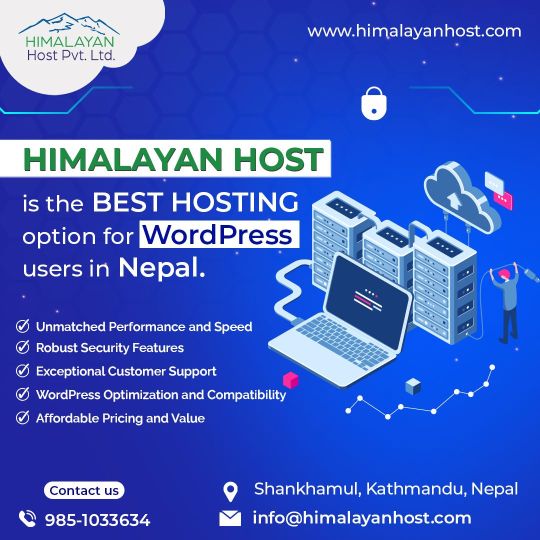
WordPress hosting has emerged as a game-changer for individuals and businesses looking to build and manage their websites with ease and efficiency. With its user-friendly interface, customizable themes, and extensive plugin ecosystem, WordPress empowers users to create stunning websites without the need for advanced technical skills. WordPress hosting in Nepal providers offer tailored solutions optimized for the platform, ensuring seamless performance, security, and scalability for websites of all sizes.
For entrepreneurs seeking to enter the hosting industry and capitalize on the growing demand for online services, reseller hosting presents a lucrative opportunity. Reseller hosting allows individuals to purchase hosting resources from a provider and then resell them to their own clients under their brand. In Nepal, reseller hosting has gained traction among web designers, developers, and digital agencies looking to diversify their offerings and generate recurring revenue streams.
One of the key advantages of reseller hosting is its flexibility and scalability, enabling resellers to customize hosting plans according to the needs of their clients and scale resources as their businesses grow. This flexibility is particularly valuable in Nepal, where businesses of all sizes are embracing digital transformation and seeking reliable hosting solutions to support their online ventures.
Furthermore, reseller hosting empowers entrepreneurs to build their hosting businesses without the overhead costs and infrastructure investments associated with traditional hosting providers. By leveraging the infrastructure and support services of a reseller hosting provider, entrepreneurs can focus on acquiring customers, delivering exceptional service, and growing their businesses without the burden of managing server infrastructure.
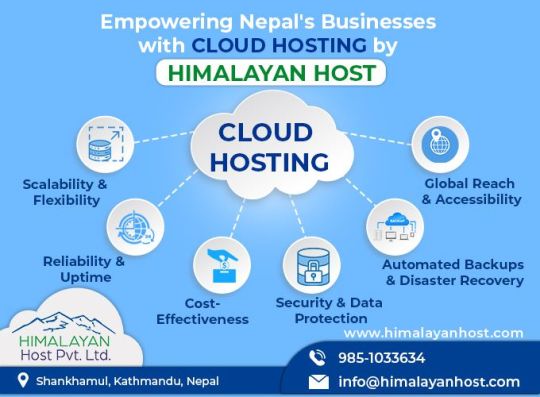
However, while WordPress hosting and reseller hosting in Nepal present promising opportunities for entrepreneurs in Nepal, challenges remain. Limited internet infrastructure, unreliable electricity supply, and regulatory hurdles pose obstacles to the seamless delivery of hosting services in some parts of the country. Additionally, competition from global hosting providers and the need to differentiate offerings in a crowded market require innovative strategies and value-added services to stand out.
To address these challenges and unlock the full potential of WordPress hosting and reseller hosting in Nepal, stakeholders must collaborate to improve internet infrastructure, streamline regulatory processes, and foster a culture of digital entrepreneurship. Government initiatives to expand broadband connectivity, incentivize investment in hosting infrastructure, and provide support for small businesses can create an enabling environment for growth and innovation in the hosting industry.
In conclusion, WordPress hosting and reseller hosting are driving a new wave of entrepreneurship in Nepal, empowering individuals and businesses to thrive in the digital age. By embracing these hosting solutions and overcoming challenges through collaboration and innovation, Nepal can position itself as a vibrant hub of digital innovation and economic opportunity.
2 notes
·
View notes
Text
What is Search Engine Optimization (SEO) And How Exactly Does it Work?
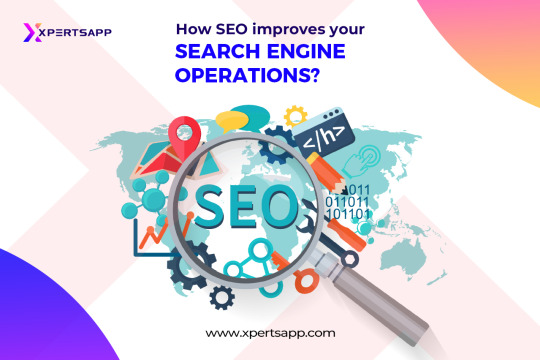
Search Engine Optimization (SEO) is one of the best marketing strategies to provide long-lasting results in terms of traffic to your site. Having that in mind, you may ask, “How does search engine optimization work?” If you ask an expert SEO consultant: It is easier to know how it works once you know about the actual tactics of SEO to develop a certain amount of traffic for your website. Furthermore, you will understand what SEO (search engine optimization) is and how it works for your digital presence to gain more traffic.
Click Here to get the best SEO Services.
What is Search Engine Optimization (SEO)?
You’ve heard that SEO service can boost your website’s ranking on Search engines and increase traffic, but you need more clarity on how it operates or what areas to concentrate on. Discover what every digital marketer needs to know about SEO by reading on. “Search Engine Optimization” often known as SEO, is the practice of obtaining visitors via unpaid, editorial, or natural search results in search engines. It seeks to raise the position of your website in search results pages. Remember that the more individuals view a website, the higher it appears on the list.
Numerous diverse tasks go into effective SEO, including:
Finding appropriate terms with high potential for search traffic
Creating valuable content of the finest quality and optimizing it for both consumers and search engines
Including relevant links from reputable, high-ranking websites
Evaluating the outcomes
(SEO) Search Engine Optimization marketing is one of the most beneficial tools to gain organic traffic for your website.
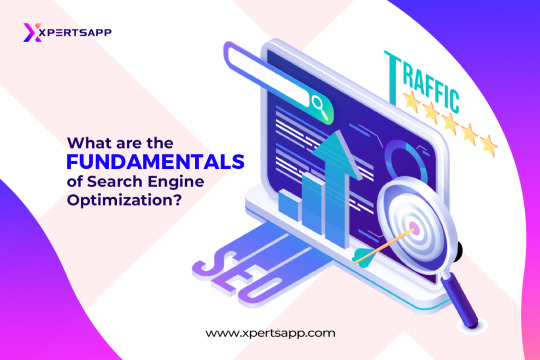
What are the Fundamentals of Search Engine Optimization?
Knowing how to get your brand, website, or company noticed by searchers is an essential skill for anybody working in digital marketing. The best SEO service providers conduct business online, and keeping up with the best SEO solutions and trends can assist your website stay on top of your game. Although SEO constantly changes in small ways, its core principles remain constant. The best SEO service providers may divide SEO service into three main pillars or components that you must be aware of and practice regularly:
Technical Optimization:
It is the process of finishing tasks on your website that aren’t directly related to content but are intended to boost SEO. Behind the scenes, activities are frequent including Website functions like loading speed, theme, and many more.
On-Page Optimization:
On-page optimization is the procedure you employ to ensure the information on your site is appropriate and offers a beautiful user experience. A content management system can help you accomplish this by choosing the proper keywords to target inside your content. Additionally, many other components are involved in On-page Optimization, including image optimization, meta tags, and descriptions for every webpage of your website. It can quickly be done with the help of effective content management systems. Content management systems like WordPress, Wix, Drupal, Joomla, Magento, Shopify, and Expression Engine are typical examples.
Off-Page Optimization:
Off-page optimization is raising your site’s ranks in search engines by engaging in activities off-site of your website. Backlinks, which help to establish the site’s reputation, are a significant factor in this. However, many forms of backlinks come to use while the best SEO company in USA and most regions implement off-page strategies for SEO link building, like profile listing, business listing, forum commenting, blog commenting, and guest posting.
How SEO Improves Your Search Engine Operations?
They use search engines when someone has a question and wants to look up the answer online. Search engine algorithms are computer programs that indicate through data to provide users with the precise results they want. Search engines use algorithms to identify websites and choose which ones to rank for a particular keyword. Search engines go through three stages to find information: crawling, indexing, and ranking. However, Crawling is the discovery stage, indexing is the filing stage, and ranking is the retrieval stage.
Crawling:
The Crawling is the initial action. Search engines send out web crawlers to discover new pages and collect data. These web crawlers are sometimes known as robots or spiders. They aim to find new websites that are available and to frequently check previously viewed pages to determine if the material has changed or been updated. Search engines use links they’ve already found to crawl web pages. When a search engine searches your homepage, it will look for another link to follow and may follow the link to your new blog post if you have a blog post connected.
Indexing:
The indexing process comes next. A search engine determines whether or not to use the content it has crawled during the indexing process. A search engine will include a crawled web page in its index if it is worthy. At the end of the ranking process, this index is employed. A web page or other piece of material that has been indexed is filed and saved in a database so that it can be retrieved later. Most websites that offer specific and valuable information are indexed. A website could be excluded from the index if:
Its content is regarded as duplicates.
Its content is regarded as being of low quality or spam.
No one could crawl over it.
There were no inbound links to the page or domain.
Ranking:
SEO consulting services recommend that the ranking comes as the third and ultimately most crucial phase. Only once crawling and indexing are finished can order take place. Your website can be ranked once a search engine has crawled and indexed it. Search engines use more than a hundred ranking factors to categorize and rank content, and they all fall under one of the three SEO pillars: technical, on-page, or off-page Optimization. For the best SEO company, Search engines employ a variety of signals to determine how to rank websites, as follows:
Presence of keywords in the title tag:
Whether or not there is a use of the term or a synonym on the page and in the title tag
Web page loading time:
Whether the website is mobile-friendly and loads quickly
Website Reputation
Refers to how well-regarded the web page and website are for the subject we search for.
Conclusion:
SEO is optimizing web pages for search engines such as Google or another search engine. The best strategy to rank your pages at XPERTSAPP as the best SEO service provider is through holistic SEO, which focuses on optimizing every component of your website. Avoid using black-hat SEO techniques because doing so will eventually hurt your rankings. Instead, focus on sustainable SEO while keeping your user in mind; you will gain over time. Our Team of experienced SEO services and experts has distinct strategies to boost your rankings on search engines organically.
#seo services#search engine optimization#digital marketing#search engine marketing#seo#website optimization#on page seo
4 notes
·
View notes
Text
Maximize Your Search Rankings with SKT SEO WordPress Theme
What Makes SKT SEO Stand Out?
The SEO WordPress Theme is a game-changer for website owners aiming to dominate search engine results. Crafted with SEO best practices in mind, this theme ensures fast load times and clean code, both essential for ranking success. It’s perfect for businesses, startups, or personal blogs looking to increase visibility without sacrificing style.
Essential Features for SEO Success
SKT SEO offers a mobile-friendly, responsive design that adapts seamlessly to any device. Its compatibility with SEO plugins like All in One SEO and SEMrush allows for advanced optimization. The theme also includes customizable sliders and social media integration, enabling you to engage visitors and promote content effectively. With easy-to-use customization tools, you can tailor your site to reflect your brand’s identity.
How SKT SEO Drives Traffic
By choosing the SEO WordPress Theme, you’re equipping your site with tools to attract organic traffic. The theme’s SEO-optimized structure helps search engines index your content efficiently, while its fast-loading pages reduce bounce rates. Additionally, its support for multilingual plugins makes it ideal for reaching a global audience.
Final Thoughts
For anyone serious about improving their website’s search engine rankings, the SEO WordPress Theme is a must-have. Its combination of speed, flexibility, and SEO-friendly features makes it an excellent choice for creating a high-performing website. Get started today and unlock your site’s full potential.
#SEO WordPress theme#SEO agency WordPress template#digital marketing SEO theme#search engine optimization WordPress theme#SEO expert website template#SEO service WordPress design#SEO consultant WordPress theme#SEO tools landing page WordPress#online marketing SEO theme#SEO-friendly WordPress layout#responsive SEO company theme#on-page SEO WordPress design#local SEO WordPress template#technical SEO WordPress theme#SEO and PPC WordPress theme#SEO-focused web design#minimal SEO agency theme#SEO firm WordPress website#SEO specialist portfolio theme#SEO blog WordPress theme
0 notes
Text
From Zero to Hero: Building Your First Affiliate Blog from Scratch

Alright, fellas, strap in because today we're diving deep into the world of affiliate blogging. We're talking about going from absolutely nothing to being the hero of your own online success story. It's time to build your first affiliate blog from scratch and carve out your slice of the digital pie.
So, where do you start on this epic journey? Well, first things first, you need a game plan. You can't just dive in blindly and hope for the best. Take a moment to map out your vision for your blog. What niche are you passionate about? What products or services do you want to promote? Get crystal clear on your goals because clarity is key to success.
Once you've got your vision locked in, it's time to get technical. Don't worry, you don't need to be a coding whiz to build a killer blog. Platforms like WordPress make it easy for even the tech-challenged among us to create professional-looking websites. Choose a clean, user-friendly theme and start customizing to make it your own.
Now, onto the fun part: content creation. This is where you really get to flex your creative muscles and showcase your expertise in your chosen niche. Whether you're into fitness, finance, or fashion, there's an audience out there hungry for your knowledge. Start brainstorming topics that will resonate with your target audience and get to writing.
But hold up, bro, before you hit publish on that first blog post, there's one crucial step you can't skip: keyword research. This is how you'll ensure your content gets seen by the right people. Use tools like Google Keyword Planner or SEMrush to identify high-volume, low-competition keywords related to your niche. Sprinkle these keywords strategically throughout your content to boost your blog's visibility in search engine results.
With your content live and kicking, it's time to start promoting like a madman. Share your blog posts on social media, join relevant online communities, and reach out to influencers in your niche for collaborations. The more eyeballs you can get on your content, the better chance you have of driving traffic and, ultimately, making those sweet affiliate commissions.
Speaking of affiliate commissions, let's talk monetization. This is where the magic happens, my friends. Sign up for affiliate programs relevant to your niche and start embedding those affiliate links into your blog posts. But here's the golden rule: only promote products or services you genuinely believe in. Your audience can smell a sellout from a mile away, so stay authentic and only endorse stuff you'd actually use yourself.
Now, I know what you're thinking: "But bro, how long until I start seeing some serious cash flow?" Here's the truth, my friend: Rome wasn't built in a day, and neither is a successful affiliate blog. It takes time, dedication, and a whole lot of hustle to make it in this game. But if you stay consistent, keep learning, and never lose sight of your goals, you'll be well on your way to affiliate marketing glory.
So there you have it, guys. Building your first affiliate blog from scratch might seem daunting at first, but trust me when I say it's worth the grind. Follow these steps, stay true to yourself, and before you know it, you'll be the hero of your own online success story. Now get out there and start hustling!
3 notes
·
View notes
Text
The Opening Theme From The Witch and the Beast Anime, Sokoninaru's "Soumonka," Has Begun Streaming Worldwide on Music Streaming Services
Sokoninaru’s “Soumonka,” the theme song to the highly acclaimed anime series The Witch and the Beast, is available on-demand around the world (excluding mainland China) and has now been released on music streaming sites. It has become a smash hit, garnering a great deal of streams, particularly from western countries. Sokoninaru is a three-piece band characterized by their incredibly technical…

View On WordPress
2 notes
·
View notes
Text
WordPress Development Services
WordPress development services refer to the professional services provided by individuals or companies to design, develop, customize, and maintain websites using the WordPress content management system (CMS). WordPress is a popular and widely-used platform for creating websites and blogs due to its user-friendly interface, flexibility, and a vast array of themes and plugins available.
These development services may include the following:
Website Design and Development: Creating custom WordPress themes or modifying existing themes to match the client's branding and design requirements.
Plugin Development: Building custom WordPress plugins to add specific functionality to the website that is not available in off-the-shelf plugins.
Website Customization: Tailoring existing WordPress themes to suit the client's unique needs and preferences.
E-commerce Solutions: Setting up and customizing WordPress websites to function as online stores using plugins like WooCommerce.
Responsive Web Design: Ensuring that the website is optimized for various devices such as desktops, tablets, and smartphones.
Website Migration: Assisting in migrating existing websites from other platforms to WordPress.
Website Maintenance and Support: Providing ongoing maintenance, updates, and technical support to ensure the website remains secure and up-to-date.
Search Engine Optimization (SEO): Optimizing the website's structure and content to improve search engine rankings and organic traffic.
Performance Optimization: Enhancing the website's speed and performance to provide a better user experience.
Content Management: Setting up and organizing content to make it easy for the website owner to update and manage.
When looking for WordPress development services, it's essential to consider the provider's experience, portfolio, reviews, and pricing to ensure they can deliver the desired results for your website.
3 notes
·
View notes
Text
A Comprehensive Guide to Creating Basic Websites for Small Businesses

In today’s digital age, having a strong online presence is essential for the success of any small business. A well-designed website not only establishes credibility but also serves as a virtual storefront that can attract and engage potential customers. Building a basic website might seem like a daunting task, but with the right approach, tools, and a clear understanding of your business goals, you can create a compelling online platform that drives growth. In this guide, we will walk you through the step-by-step process of creating basic websites for small businesses.
1. Define Your Objectives

Before you dive into designing and developing your website, it’s crucial to define your objectives. What purpose will your website serve? Are you looking to showcase your products, provide information about your services, generate leads, or facilitate online sales? By having a clear understanding of your goals, you can tailor your website’s design and content to achieve those objectives effectively.
2. Choose a Domain Name and Hosting

Your domain name is your website’s address on the internet (e.g., www.yourbusinessname.com). Choose a domain name that reflects your business, is easy to remember, and preferably includes keywords related to your industry. Once you’ve chosen a domain name, you’ll need a hosting provider to store your website’s files and make them accessible to visitors. There are many hosting options available, ranging from shared hosting to dedicated servers. Consider your budget and the technical support provided when making your decision.
3. Select a Website Building Platform

For small businesses looking to create basic websites without advanced coding skills, website builders are the way to go. These platforms offer user-friendly interfaces and customizable templates that allow you to create and manage your site effortlessly. Some popular website builders include:
WordPress:

A versatile platform with a vast library of themes and plugins that can accommodate a wide range of business needs.
Wix:

Known for its drag-and-drop functionality and visually appealing templates.
Squarespace:

Offers elegant designs and is particularly suitable for creative businesses.
Weebly:

Provides a simple, drag-and-drop interface along with e-commerce capabilities.
Choose a platform that aligns with your business requirements and suits your comfort level with technology.
4. Design Your Website

Your website’s design plays a crucial role in making a positive first impression. Keep these design principles in mind:
Simplicity:

A clean and uncluttered design makes it easier for visitors to navigate your site and find the information they need.
Branding:

Use your business’s logo, colors, and fonts consistently across the site to reinforce your brand identity.
Navigation:

Create a clear and logical navigation menu that helps visitors find different sections of your website without confusion.
Mobile-Friendly:

Ensure your website is responsive, meaning it adapts well to various screen sizes, including smartphones and tablets.
Visuals:

Incorporate high-quality images and graphics that are relevant to your business. Avoid stock photos that look generic.
5. Craft Compelling Content

Content is king when it comes to engaging visitors and keeping them on your website. Develop content that effectively communicates your message and value proposition:
Homepage:

Clearly state what your business offers and how it benefits your customers. Use concise, attention-grabbing headlines.
About Us:

Share your company’s story, mission, and values. Highlight what sets you apart from competitors.
Products/Services:
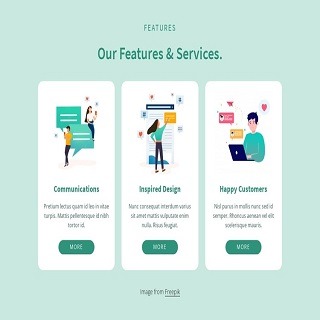
Provide detailed descriptions, images, and prices for your products or services. Use persuasive language to showcase their benefits.
Contact Information:

Make it easy for visitors to get in touch with you. Include a contact form, phone number, email address, and physical address if applicable.
Blog:

If relevant, start a blog to share industry insights, tips, and updates. This can position your business as an authority in your field.
6. Optimize for SEO

Search Engine Optimization (SEO) is essential for increasing your website’s visibility in search engine results. Here are some basic SEO practices to implement:
Keyword Research:

Identify relevant keywords related to your business and incorporate them naturally into your content.
Meta Tags:

Write compelling meta titles and descriptions for each page to entice users to click through from search results.
URL Structure:

Create clean and descriptive URLs for your pages. Avoid using long strings of numbers or characters.
Image Optimization:

Compress images to reduce loading times and add alt text to describe images for accessibility and SEO.
7. Test and Optimize

Before launching your website, thoroughly test it to ensure it functions correctly on various devices and browsers. Check for broken links, typos, and any design inconsistencies. User experience is paramount, so ask friends or colleagues to navigate your site and provide feedback.
8. Launch Your Website

Once you’re confident in the functionality and design of your website, it’s time to launch! Make your website live by connecting your domain name to your hosting provider. Promote your website through your social media channels, email newsletters, and any other marketing platforms you use.
9. Monitor and Maintain

Creating a website is an ongoing process. Regularly monitor your website’s performance using tools like Google Analytics. This will help you understand visitor behavior, track conversions, and identify areas for improvement. Update your content as needed, and stay current with industry trends to keep your website relevant.
10. Consider E-Commerce (If Applicable)

If your small business involves selling products, consider adding e-commerce functionality to your website. Many website builders offer integrations with popular e-commerce platforms. Ensure a seamless shopping experience by providing clear product descriptions, high-quality images, secure payment options, and efficient customer support.
Creating a basic website for your small business is a valuable investment that can yield significant rewards. With careful planning, attention to design, compelling content, and effective SEO, your website can become a powerful tool for attracting and engaging customers.
Remember, your website is a reflection of your business’s identity, so make sure it accurately represents your brand and delivers a positive user experience. By following the steps outlined in this guide, you’ll be well on your way to establishing a successful online presence for your small business.
1 note
·
View note
Text
A Practical Guide to Ecommerce Development: WordPress, Shopify, and Choosing the Right Services
Digital commerce has become essential for businesses of all sizes. Whether starting small or managing a growing catalog of products, having a reliable, scalable, and easy-to-manage ecommerce setup is critical. But with multiple platforms and service models available, selecting the right path can be challenging.
This article explores three key areas of focus in the ecommerce space: ecommerce development services, WordPress development services, and the value of working with a Shopify development agency. Understanding the strengths, limitations, and suitable use cases for each helps businesses make decisions based on actual needs—not trends.
What Do Ecommerce Development Services Include?
Ecommerce development services refer to the technical planning, construction, and support of an online store. This includes setting up platforms like WooCommerce or Shopify, configuring product categories, managing payment gateways, and ensuring mobile responsiveness.
Core Components of Ecommerce Development
Platform Setup Depending on the product range and business model, developers set up platforms such as WordPress, Shopify, or Magento.
Design and User Interface A structured layout, easy navigation, and responsive design improve the overall user experience and conversion rates.
Product and Inventory Management Services often include integration with inventory systems, setting up variants, attributes, and real-time stock tracking.
Payment and Checkout Integration Secure, smooth payment gateways and easy checkout experiences reduce cart abandonment.
Shipping Configuration Ecommerce services also include linking with logistics providers, calculating real-time rates, and handling multi-location shipping needs.
Analytics and Tracking Integration with Google Analytics or custom dashboards provides data on sales performance and customer behavior.
Security and Maintenance SSL setup, regular updates, and monitoring ensure the site remains safe and operational at all times.
Who Needs These Services?
From first-time store owners to established retailers looking to scale, ecommerce development services are useful for businesses that:
Want to build a new store from scratch
Need to migrate platforms
Plan to customize existing functionality
Require integration with third-party apps or internal systems
WordPress Development Services for Ecommerce
WordPress is widely known as a content management system, but with the WooCommerce plugin, it also serves as a full-fledged ecommerce platform. Its open-source structure and wide plugin ecosystem make it a flexible option for businesses with specific design or content needs.
What WordPress Development Services Typically Cover
WooCommerce Setup Installation, configuration, and customization of the WooCommerce plugin to manage products, payments, and shipping.
Custom Theme Development Creating themes from scratch or modifying existing ones to align with business identity and layout requirements.
Plugin Integration Extending functionality using plugins for SEO, customer support, analytics, and more.
Site Performance Optimization Image compression, caching tools, and lazy loading for faster page loads.
Security and Backup Adding security plugins, SSL setup, and backup scheduling to keep the site protected.
Content Structure Managing posts, pages, and taxonomy to ensure consistent user experience across blog and product areas.
Advantages of Using WordPress for Ecommerce
Flexibility: Offers full control over design and backend code
Community Support: Thousands of themes, plugins, and developer communities
Cost Control: Hosting and development can be scaled based on budget
Content Focused: Ideal for businesses that balance ecommerce with content (e.g., magazines with online shops)
Points to Consider
Requires separate hosting
Maintenance and updates are manual or plugin-dependent
Some technical learning required if managed in-house
Businesses that need a blend of content management and product selling—especially with multiple product types or frequent blog updates—often choose WordPress development services.
The Role of a Shopify Development Agency
Shopify is a hosted ecommerce platform focused entirely on product-based selling. With built-in hosting, security, and user-friendly tools, it’s often preferred by businesses that want a fast setup and minimal technical maintenance.
A Shopify development agency specializes in creating, customizing, and managing Shopify stores to meet the specific needs of clients.
Typical Services Offered by a Shopify Development Agency
Store Setup Product import, category organization, and basic Shopify configuration.
Theme Customization Modifying existing themes or creating custom ones using Liquid, Shopify’s templating language.
App Integration Connecting third-party apps for reviews, loyalty programs, subscriptions, or advanced analytics.
Custom Functionality Adding advanced features such as dynamic pricing, multi-location inventory, or product bundling.
Store Migration Transferring existing stores from platforms like WooCommerce, Magento, or Wix to Shopify without losing data or SEO ranking.
Ongoing Support Updates, bug fixes, UX improvements, and data reporting.
When to Choose Shopify
Quick launch timelines
Limited technical resources in-house
Need for scalable infrastructure without hosting concerns
Preference for predictable monthly costs
Focused solely on product selling (vs. content or membership sites)
For small to mid-sized businesses, or those scaling rapidly, working with a Shopify development agency ensures the store remains optimized, fast, and user-friendly.
Choosing the Right Development Partner
Whether selecting a freelancer, an internal team, or an external agency, the development partner should:
Understand your business model and growth plans
Recommend a platform based on actual requirements
Provide transparent timelines and deliverables
Offer post-launch support and performance monitoring
Be experienced in working with the platform of your choice
A balanced approach between strategy, execution, and support ensures long-term results. One such provider that handles both ecommerce development services and platform-specific solutions is webiators, known for working across WordPress and Shopify environments.
Final Thoughts
Building an ecommerce presence requires more than a platform—it requires a structure that supports long-term goals, adapts to growth, and delivers consistent performance. Whether through WordPress development services for full control, or a Shopify development agency for speed and scalability, choosing the right approach comes down to understanding your current needs and future direction.
Development services help translate business ideas into digital storefronts that not only work but grow with you—one order, one customer, and one update at a time.
0 notes